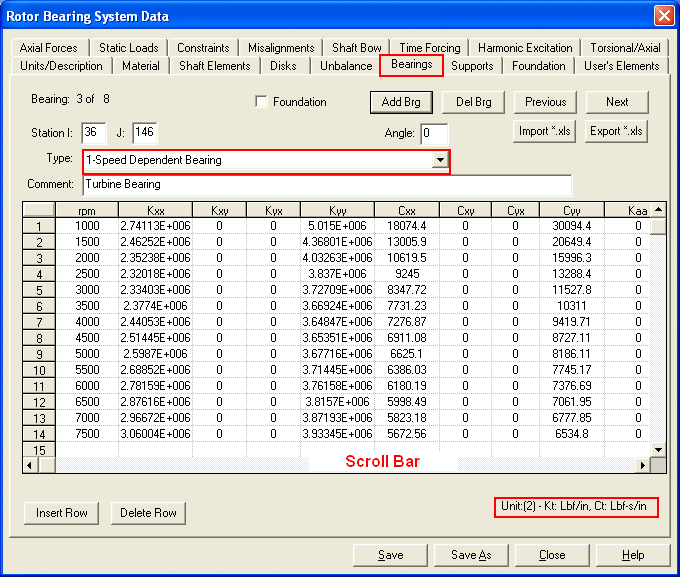
Speed (Frequency) Dependent Bearing
This option allows you to specify speed dependent linearized bearing coefficients. These coefficients are usually obtained from the bearing performance programs or experiments. A total of twenty-four (24) bearing dynamic coefficients may be provided for each shaft rotational speed. The rotational speed of shaft 1 is used for the case of multi-shaft systems. If the number of data (speed) points is greater than or equal to 3, a spline function is used in the program to interpolate the coefficients for the shaft speeds requested in the analysis that are not given in the data points. If the number of data (speed) points is equal to 2, a linear function is used to obtain the coefficients for the shaft speeds that are not given in the data points. If there is only one point in the data, then it will be treated as a linear constant bearing. The use of spline function allows a small number of needed data points. Since the spline function is used in the interpolation, the data must be entered in the increasing order according to the speed value. Also, the extrapolation of the data outside the data range can be very unpredictable. Caution must be taken when extrapolating the data. If the bearing/support properties are frequency dependent, for synchronous vibration, these frequency dependent coefficients may be entered as speed dependent coefficients.
The 24 bearing (or equivalent) coefficients are translational stiffness, damping, and mass coefficients, and rotational stiffness, damping, and inertia coefficients. Therefore, the data format is shown as follows:
rpm, Kxx,Kxy,Kyx,Kyy,Cxx,Cxy,Cyx,Cyy,Mxx,Mxy,Myx,Myy, Kaa,Kab,Kba,Kbb,Caa,Cab,Cba,Cbb,Maa,Mab,Mba,Mbb

See also Bearings and Linear bearing
Copyright © 2014-2017